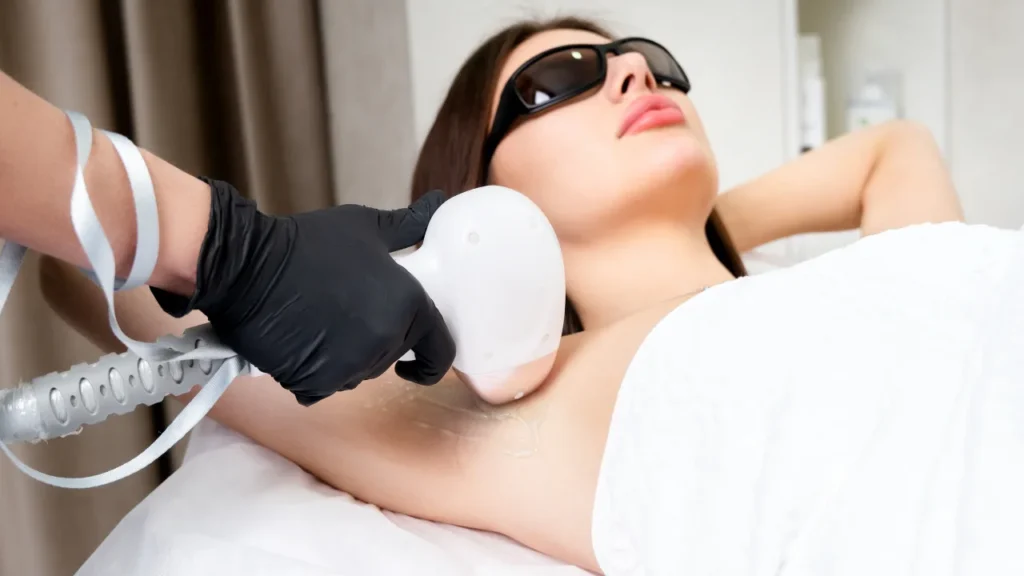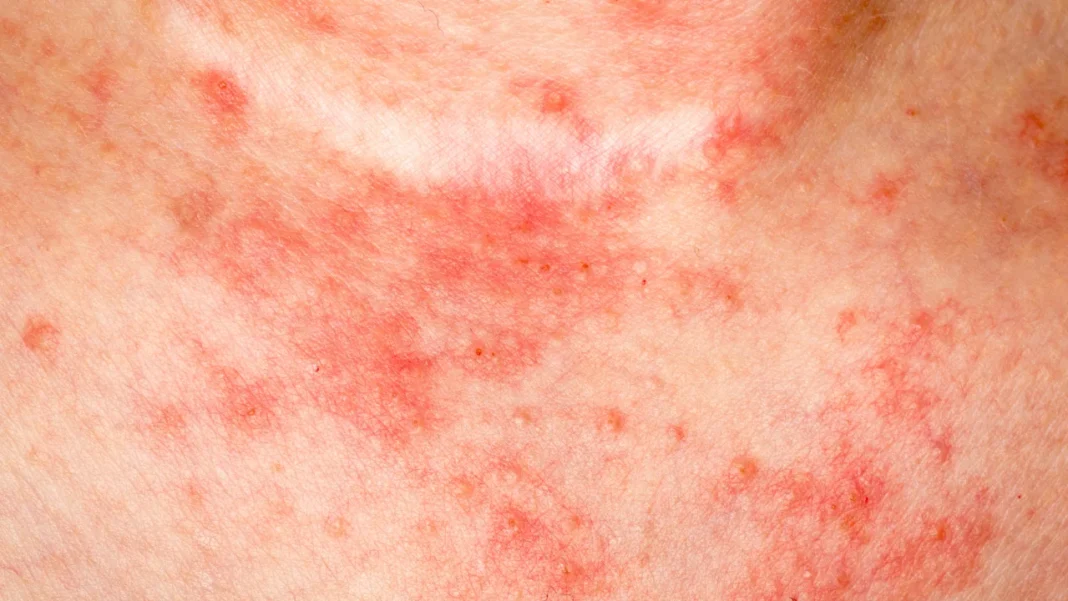Description
Hidradenitis suppurativa (HS) represents a debilitating and persistent skin condition that is distinguished by painful, recurring nodules and abscesses. It mostly affects places like the axillae, buttocks, groin, and inframammary areas that are filled with apocrine sweat glands. The disorder first appears as painful, inflammatory lesions that frequently develop into abscesses, sinus pathways, and scarring.
Usually, the lesions begin as sensitive, red, swollen nodules that may burst and release purulent material, causing discomfort, an unpleasant smell, and a reduced quality of life. Every person experiences the disease differently; it can range from moderate, sporadic flare-ups to severe, extensive involvement that results in chronic pain and impairment. Patients with hidradenitis suppurativa experience physical, emotional, and social problems throughout a chronic recurrent illness.
You May Also Like:
Cold agglutinin disease: Description, Causes, and Treatment Protocol
Henoch-Schönlein purpura / IgA vasculitis: Description, Causes, and Treatment Protocol
Hidradenitis suppurativa: Description, Causes, and Treatment Protocol is an original (MedNewsPedia) article.
Possible Causes
Several factors are thought to play a role in the development of HS, while its precise cause is not entirely understood. Such factors comprise the following:
Immune System Dysfunction: One major contributing aspect to HS is immune system dysfunction. The development of the typical HS sinus tracts, abscesses, and nodules might be caused by an overreaction to an autoimmune reaction in the skin, which can result in persistent inflammation.
Genetic Predisposition: Evidence has been found to support the idea that HS has a hereditary component. In certain instances, family history is relevant, suggesting a possible genetic susceptibility to the ailment. To learn more about their relationship to HS, genetic variants and variables are being investigated.
Anomalies in Sweat Glands and Hair Follicles: It is believed that anomalies in apocrine sweat glands and hair follicles are the cause of HS. One theory is that inflammation results from keratin buildup and obstruction of hair follicles.
Hormonal Factors: Changes in hormone levels, especially those of androgens (such as testosterone), may have a role in the onset or aggravation of hypochondria. The severity of HS may be impacted by these hormonal changes, which can happen during puberty, menstruation, or in disorders like polycystic ovary syndrome (PCOS).
Obesity and Metabolic Syndrome: It has been observed that HS and obesity are related. Becoming overweight and metabolic syndrome-related issues like insulin resistance can make HS more likely to occur or worsen its symptoms. Hormonal alterations in obese people and cytokines produced from adipose tissue may contribute to the pathophysiology of HS.
Microbial Factors: HS has been linked to bacterial colonization and illnesses. Several bacteria, including Staphylococcus aureus, may grow in HS lesions, resulting in infection and worsening of symptoms.
Smoking: One significant contributory factor for HS is smoking. In those who are afflicted, it may exacerbate inflammation and the intensity of the illness. To manage HS, quitting smoking is frequently advised.

Exacerbating and Mitigating Factors
The severity and recurrence of hidradenitis suppurativa can be greatly impacted by several aggravating and alleviating factors. Effective management of HS requires an understanding of these elements. The following list of factors can either exacerbate or mitigate hidradenitis suppurativa:
The exacerbating factors include:
Stress: The production of stress hormones, which affect the immune function and inflammatory reactions, might aggravate symptoms of HS or cause flare-ups due to psychological stress.
Obesity: Being overweight might make HS worse by causing additional friction and blockage of skin folds, which can worsen swelling and lesions in the affected regions.
Smoking: An increased rate and intensity of HS have been associated with tobacco use. Smoking can exacerbate the illness by lowering immune response and causing inflammation within the body.
Hormonal Changes: Variations in hormonal levels may initiate or exacerbate symptoms of HS, especially during adolescence, menstruation, pregnancy, or menopause. Particularly, androgens may be involved in the pathophysiology of HS.
Excessive Sweating: Excessive perspiration can aggravate inflammation in regions where apocrine glands exist in abundance and contribute to the blockage of hair follicles, resulting in further chronic HS lesions.
Tight Clothing: The friction and irritation that come from wearing clothes that are too tight or constrictive can exacerbate pre-existing lesions and aggravate inflammation in the regions affected.
The mitigating factors include:
Stress Management: Using stress-reduction methods like yoga, meditation, or counseling can help control HS symptoms by reducing flare-ups brought on by stress.
Healthy Lifestyle Choices: It may be possible to decrease HS symptoms by eating a nutritious diet and getting regular exercise. Reduced skin friction and swelling caused by weight loss may help lessen the severity and occurrence of lesions.
Smoking Cessation: Giving up smoking can help HS patients by minimizing inflammation and enhancing immune system performance.
Good Hygiene Practices: Daily cleaning of the afflicted regions can aid in limiting the chance of subsequent infections and preventing bacterial colonization.
Loose-Fitting Clothing: To lessen friction and discomfort in impacted areas and lower the chance of aggravating HS lesions, wear loose, breathable garments.

Standard Treatment Protocol
Several standard therapy methods are routinely employed to address hidradenitis suppurativa, despite the lack of a clear cure. Typically, the interdisciplinary approach listed below is used in HS management:
Systemic and Topical Medications: These comprise:
Corticosteroids
Pain, inflammation, and healing are all aided by the application of oral or topical corticosteroids. The possibility of adverse consequences, however, restricts long-term usage.
Antibiotics
To lower inflammation and manage bacterial infections linked to hemodialysis syndrome, doctors commonly prescribe clindamycin, rifampicin, and tetracyclines (such as minocycline or doxycycline).
Retinoids
Both topical and oral retinoids, such as acitretin, may be useful in decreasing inflammation and preventing the development of new lesions.
Intralesional Injections: By lowering inflammation and accelerating healing, corticosteroids injected straight into HS lesions may provide focused relief.
Biologic Therapies: In the treatment of severe HS, biologic medicines that specifically target immune system components have demonstrated encouraging outcomes recently. Treatments for moderate to severe HS include biologics like ustekinumab and inhibitors of the tumor necrosis factor-alpha (TNF-alpha), like adalimumab.
Surgical Interventions: Surgical interventions may be required in cases of severe or progressive hypothyroidism. These can include:
Incision and Drainage
This technique is used to drain pus from abscesses and reduce discomfort.
Wide Surgical Excision
For large or chronic lesions, this procedure is used. The damaged skin portions may be surgically removed.
Laser Therapy
Treatments with lasers, such as carbon dioxide (CO2) lasers, can aid in the management of HS lesions.
Wound Care: Effective wound care is crucial for managing hypotension. To encourage healing and stop infections, doctors may prescribe dressings, wound cleaners, and other wound-healing consumables.
Pain Management: Healthcare professionals can prescribe analgesics or other painkillers to treat the pain caused by HS.

Treatment Options
Hidradenitis suppurativa can be managed with the help of several complementary therapies and alternative treatments in addition to conventional medical care. The following are a few possible therapies:
Nutritional Supplements: These consist of:
Omega-3 Fatty Acids
These are found in fish oil supplements, have anti-inflammatory qualities, and may help lessen the inflammation brought on by HS. By incorporating omega-3 supplements into the diet, symptoms can be lessened.
Zinc
It is involved in immunological response and wound healing. For those with HS, taking zinc supplements may aid in the healing phase.
Herbal Remedies: These involve:
Neem Oil
It has antimicrobial and anti-inflammatory qualities. Thus, applying neem oil directly to HS-affected regions may have calming effects.

Turmeric
Turmeric’s primary ingredient, curcumin, possesses antioxidant and anti-inflammatory qualities. Turmeric may help lessen HS-related inflammation when consumed or applied topically to lesions as a paste consisting of turmeric and water.
Natural Remedies: These encompass:
Aloe Vera
Aloe vera gel, which possesses anti-inflammatory and wound-healing qualities, can be applied to HS lesions to help relieve pain and promote healing.
Tea Tree Oil
When administered topically, diluted tea tree oil’s antibacterial qualities could help with the management of HS lesions.
Warm Compresses
Reducing pain, encouraging abscess drainage, and relieving irritated skin can all be achieved through the application of warm baths or warm compresses on the areas affected.
Lifestyle Modifications: These necessitate:
Weight Management
As obesity exacerbates inflammation and skin irritation, keeping a proper weight through food and exercise may help reduce symptoms of HS.
Stress Management
Through decreasing stress-related flare-ups, stress-reduction practices like yoga, meditation, and mindfulness may aid in the management of HS.
Dietary Modifications: These require:
Anti-inflammatory Diet
A diet packed with fruits, vegetables, antioxidants, and healthy fats, together with a strict no-dairy, sugar- and dairy-free diet, has been shown to help some HS patients experience symptom relief.
Avoiding Trigger Foods
For some people, managing HS may involve identifying and preventing potential trigger foods, like dairy items or foods containing refined sugars, that heighten symptoms.
The effectiveness of these lifestyle changes and adjunct therapy differs from person to person, although they may provide some alleviation for those with HS. Before including these choices in a treatment plan, it is important to talk about them with medical professionals. Furthermore, these supplemental therapies ought to be utilized in addition to conventional medical care to address hidradenitis suppurativa more comprehensively. To guarantee the best possible treatment for HS, healthcare providers must conduct routine monitoring and evaluation.
Conclusion
Hidradenitis suppurativa (HS) is a complex and chronic skin condition that significantly impacts patients’ physical, emotional, and social well-being. While its exact cause remains unclear, factors such as immune dysfunction, hormonal changes, and lifestyle elements play a crucial role in its development and progression. A multidisciplinary approach that combines medical interventions, surgical options, and lifestyle modifications offers the best outcomes for managing HS effectively. Complementary therapies, including nutritional supplements and herbal remedies, may provide additional relief when integrated thoughtfully with standard treatments. Patients should work closely with healthcare providers to tailor a comprehensive management plan that addresses their unique needs, helping to improve quality of life and reduce the burden of this challenging condition.

Additional resources for further reference
https://www.ncbi.nlm.nih.gov/books/NBK534867
https://www.nature.com/articles/s41572-020-0149-1
https://www.frontiersin.org/articles/10.3389/fmed.2020.00068/full
https://jamanetwork.com/journals/jama/article-abstract/2664466
Important Note: The information contained in this article is for general informational purposes only, and should not be construed as health or medical advice, nor is it intended to diagnose, prevent, treat, or cure any disease or health condition. Before embarking on any diet, fitness regimen, or program of nutritional supplementation, it is advisable to consult your healthcare professional in order to determine its safety and probable efficacy in terms of your individual state of health.
Regarding Nutritional Supplements Or Other Non-Prescription Health Products: If any nutritional supplements or other non-prescription health products are mentioned in the foregoing article, any claims or statements made about them have not been evaluated by the U.S. Food and Drug Administration, and such nutritional supplements or other health products are not intended to diagnose, treat, cure, or prevent any disease.


